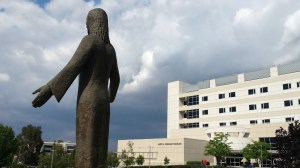In this series

The US Supreme Court unanimously affirmed today that religiously affiliated organizations—including hospitals, schools, and daycares—are exempt from the US Employee Retirement Income Security Act (ERISA).
The ruling on a trio of Christian hospital lawsuits overturns three regional federal appeals courts, each of which ruled against the hospitals. It also saves the health care systems from having to pay out billions to employees, and will impact dozens of similar cases waiting in courts across the country.
“From the beginning, ERISA has defined a ‘church plan’ as ‘a plan established and maintained … for its employees … by a church,” wrote Justice Elena Kagan for the court. (Recent Supreme Court addition Justice Neil Gorsuch, who was on the court when arguments were heard, did not participate in the decision.)
“A plan maintained by a principal-purpose organization qualifies as a ‘church plan,’ regardless of who established it,” Kagan wrote.
“Churches—not government bureaucrats, and certainly not ambulance chasers—should decide whether hospitals are part of the church,” stated Eric Rassbach, deputy general counsel at Becket, which filed an amicus brief on behalf of the hospitals. “It is simple common sense that nuns, soup kitchens, homeless shelters, seminaries, nursing homes, and orphanages are a core part of the church and not an afterthought.”
Becket said that in the last four years, nearly 100 lawsuits have been filed against religious hospitals for opting out of for-profit pension plans. Religion Clause named this issue the No. 4 church-state development of 2016.
“Increasingly, it is being argued that the distinctive mission and character of religious institutions should lose legal protection when these institutions are involved in providing health care, or work to provide adoption services or foster care, or cooperate with government to solve problems of poverty, human trafficking, education, and so on,” wrote University of Notre Dame law professor Rick Garnett.
“Many believe that these institutions should not be allowed to object, as a matter of religious conscience to—for example—providing abortions or abortion referrals,” he continued. “And while it is primarily the job of Congress and other legislators to protect these institutions' religious-conscience rights, today's decision by the Court is a welcome and well-crafted vindication of one such effort.”
Reuters connected the case with Hobby Lobby’s contraception win in 2014, noting that “the ruling is the latest in which the justices endorsed the idea that certain businesses deserve wider latitude because of religious considerations.”











